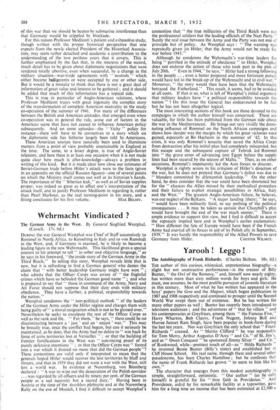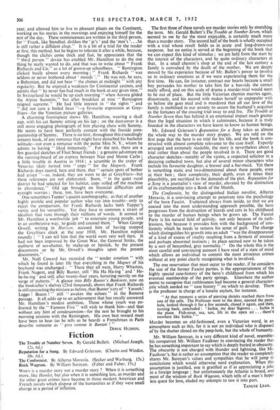Yarooh ! Legg° !
The Autobiography of Frank Richards. (Charles Skilton. 10s. 6d.) THE author of this curious, whimsical, unpretentious biography—a slight but not unattractive performance—is the creator of Billy Bunter, " the Owl of the Remove," and, himself now nearly eighty, has written more than sixty million words for boys and girls. He must, one assumes, be the most prolific purveyor of juvenile literature in this century. Most of what he has written has appeared in the boys' papers the Gem and the Magnet, which began publication in 1907 and 1908 respectively and continued to.prosper until the Second World War swept them out of existence. But he has written for many other papers as well ; Bunter has recently been introduced to television audiences ; and the adventures of " that fat villain " and his contemporaries at Greyfriars, among them " the Famous Five," Harry Wharton, Bob Cherry, Frank Nugent, Johnny Bull and Hurree Jamset Ram Singh, have been popular in book-form during the last ten years. Nor was Greyfriars the only school that " Frank Richards " created. As " Martin Clifford " he was responsible for Tom Merry, Arthur Augustus D'Arcy " and Co." of St. Jim's, and as " Owen Conquest " he sponsored Jimmy Silver " and Co." of Rookwood, while—prettiest touch of all—as " Hilda Richards " he invented Bessie Bunter (Billy's sister) and established her at Cliff House School. His real name, through these and several other pseudonyms, has been Charles. Hamilton ; but he confesses that the name of Frank Richards has grown " to seem to him like his own." The character that emerges from this modest autobiography is simple, straightforward, optimiStic. " Our author " (as he calls himself) is grateful for his " firm faith in Providence." And Providence, aided by his remarkable facility at a typewriter, gave him for a long time an income that has been estimated at £2,500 a year, and allowed him to live in pleasant places on the Continent, working on his stories in the mornings and enjoying himself for the rest of the day. These reminiscences are written in the third person, for " Frank, like Stendhal, dislikes the ` je's ' and the `moi's '... he is still rather a diffident chap." It is a bit of a trial for the reader at first, this method, but he begins to tolerate it after a while, because, though the clichés come thick and fast, he appreciates that the " third person " device has enabled Mr.. Hamilton to do the one thing he really wanted to do, and that was to write about " Frank Richards and Co." as a lot of grown-up schoolboys. " Remington clicked busily almost every morning " Frank Richards " was seldom or never bothered about ` moods '." He was not, he says, a Bohemian, and did not hear " the chimes at midnight " with any regularity. But he enjoyed a weakness for Continental casinos, and admits that " he never has had much in the bank at any given time." In Switzerland he would be up each morning " when Aurora gilded the Alpine Summits," but after breakfast at nine " Remington reigned supreme." He had little interest in " the sights " and " did not care a boiled bean "—a favourite expression at Grey- friars—for the Venetian picture galleries.
A charming frontispiece shows Mr. Hamilton, wearing a skull cap, with his cat Sammy sitting on his lap ; on the dust-cover is a still more engaging photograph of him playing chess with Sammy. He seems to have been perfectly content with the fireside com- panionship of Sammy. There is no hint, throughout this exceedingly reticent book, of any romance that might have disturbed his bachelor solitude—not even a romance with the petite Miss N. Y., whom he admits to having " liked immensely." For the rest, there are a few guarded sketches of Fleet Street friends ; a genuine adventure on the running-board of an express between Nice and Monte Carlo ; a little trouble in Austria in 1914 ; a scramble in the crater of Vesuvius (duly turned into " copy " for the Magnet). Frank Richards does record, here and there, that " certain spots of bother had arisen "—as, indeed, they are wont to do at Greyfriars—but these references are not elaborated. Soon, " in the quiet rural district he had selected for his habitat, copy rolled off the machine in abundance." Old age brought on financial difficulties and eyesight worries ; these, too, have been overcome.
One remembers Tupper's quaint autobiography, as that of another highly prolific and popular author who ran into trouble—only to reject the comparison, for Frank Richards lacks both Tupper's vanity and his versatility. Yet they have in common a strain of idealism that runs through their millions of words. it seemed to Mr. Hamilton a worthwhile job " to entertain young people, and in an unobtrusive way, to guide and counsel them." When George Orwell, writing in Horizon, accused him of having stopped the Greyfriars clock at the year 1910, Mr. Hamilton replied roundly : " I can tell him that the world went very well then. It had not been improved by the Great War, the General Strike, the outburst of sex-chatter, by make-up or lipstick, by the present discontents or by Mr. Orwell's thoughts upon the present discontents."
Mr. Noel Coward has recorded the " tender emotion " with which he found in later life that everything in the Magnet of his boyhood was unchanged : " There they all were, Harry Wharton, Frank Nugent, and Billy Bunter, still Ha Ha Ha-ing ' and He- he-he-Mg ' and still, after twenty-four years, hovering merrily on the verge of puberty." A glance into Billy Bunter's Banknote; now on the bookseller's shelves (23rd thousand), shows that Frank Richards is still concocting the mixture as before, that Bunter's cry of " Yarooh! Leggo ! Beasts ! " still " awakes the echoes " in the Remove passage. It all adds up to an achievement that has royally answered Mr. Hamilton's modest ambition. Those whose youth was en- livened by the " Famous Five " will wish to thank him—and that without any hint of condescension—for the zest he brought to his morning sessions with the Remington. His own best reward must have been to hear (as he tells us he heard) a Frenchman in Paris describe someone as " gros comme le Buntair ! "
DEREK HUDSON.



































 Previous page
Previous page